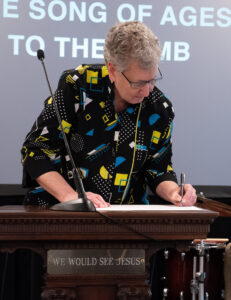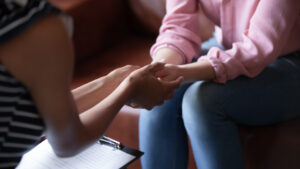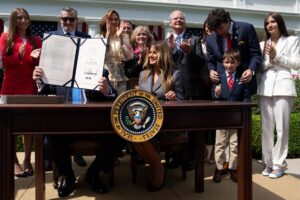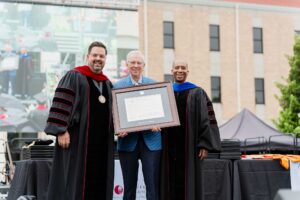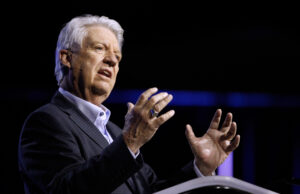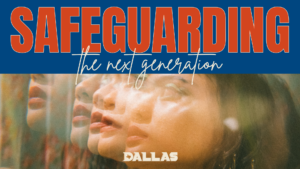
DURBAN, South Africa (BP)–With quiet intensity, Archbishop Desmond Tutu, chair of South Africa’s Truth and Reconciliation Commission, told members of the Baptist World Alliance’s General Council of how human rights abuses have been brought to light and reconciliation is taking place in South Africa.
“It is not me who is accomplishing reconciliation,” Tutu told an overflow audience of more than 500 people from around the world the morning of July 8. “It is God who was in Christ reconciling the world to himself. It is the work of God that God’s Holy Spirit moves and moves so powerfully.”
Tutu recounted the memorable day of April 27, 1994, when the world watched “in wonderment and considerable awe as it saw long lines of South Africans snaking their way to the ballot boxes.”
“I was 63 years old when I voted for the first time in the land of my birth,” Tutu said.
However, Tutu said, democratic freedom would never have been achieved if the country had chosen either retributive justice or blanket amnesty for what happened in the past.
Government security forces would never have agreed, if they knew they would be tried at the end of the process, Tutu said, while blanket amnesty, or what he described as amnesia, “would victimize the victims the second time around.”
“We decided on a process of truth in exchange for freedom,” he said. Upon application, amnesty would be given to individuals who committed atrocities between 1960 and 1994, which Tutu described this amnesty as “victim-friendly,” allowing people to tell their story. There is therapy in the telling, Tutu said, because for so many years these people, whom he described as “the invisible present ones,” were treated like rubbish. “In the telling of their stories there is a rehabilitation of their dignity,” he said.
And what stories Tutu told.
He described how he broke down and cried on the first day of the Truth and Reconciliation Commission’s proceedings, when a man who had been a prisoner and was now in a wheelchair became so frustrated by a speech impediment that kept him from fully describing a particular form of torture that he covered his face and wept.
“When he broke down I had already heard so much that I was bottled up and I broke down too.”
After that, Tutu said, “I had a discussion with God and asked him to help me not to cry because the media would not focus on the testimony but on me. Many times I would look up to God and try all kinds of strategies to keep me from crying.”
It was hard not to weep as Tutu described some of the truths they uncovered.
“We found out only recently,” said Tutu, “what happened to Steve Biko, a young lawyer who became a hero of the anti-apartheid movement. When the perpetrators appealed for amnesty, they told us what they did. After a vicious attack which resulted in a brain damage, he was driven naked in a police van from Port Elizabeth to Pretoria.”
Tutu also told of a mother who came with a plastic bag that had clumps of her son’s hair. “Where is my son?” she asked. She described how, after being detained when he came home, “he began to swell, his hair fell out and he could no longer walk.” One day while in a wheelchair, he went with a friend to the hospital for a checkup and never came back. The police said they found his car between the Lesotho and Johannesburg border.
“At the commission we found out what happened,” Tutu said. “They abducted him, drugged him, shot him in the head and burned his body. As they sat on one side drinking beer and eating barbecue, his body burned on the other side.
“How could we really sink so low?” Tutu asked.
According to Tutu the commission also found that the previous government had been clandestinely using biological weapons against black Africans. “Now we ask,” Tutu said, “it is possible that some of our communities are afflicted by scourge because of this program?”
“So many people come to us and ask, ‘Can you find out what happened to my son or daughter? Can you produce a bone so I can give him a decent burial?’ We had been able to find people who were killed secretly and open the graves so people can identify their relatives. Once they find them there is closure.
“We have heard horrendous things for two years,” Tutu said, “but we have also stood on holy ground.”
Tutu told of the testimony of the officer in charge of the police force that killed and injured many at the Bisho massacre. “I was riled by what he said and how he said it,” Tutu recounted. “The hall was packed with people who had lost loved ones and you could cut the tension and anger with a knife. Then one white and three black officers said, ‘Yes we gave orders to the soldiers to open fire.’ The white officer turned to the audience and said, ‘Please forgive my colleagues here and receive them back into the community.’ The angry audience broke out into applause. I told them to keep quiet,” Tutu said, “we are in the presence of something holy.”
When a white woman, victim of a hand grenade attack by a black liberation movement, testified, she described how she was so badly injured that her children had to bathe, clothe and feed her. “This experience has enriched my life,” Tutu quoted the woman as telling the commission. “I hope to meet the perpetrator to forgive him and I hope he forgives me,” she said.
Just one month ago an Indian leader of the African National Congress (ANC) which detonated a bomb and blinded a white officer in Pretoria, appealed for amnesty. “I want to apologize for all the harm I did,” the ANC leader said.
The newspapers carried a picture of the blind white man and the Indian ANC member holding hands. “I consider this an icon,” Tutu said. The white man said both of them did not want to let go each other’s hand. “If this is the only thing the commission has done,” Tutu said, “it is well worth it.”
“God has told me we will succeed in South Africa,” Tutu said, “not because we are smart or virtuous but for the sake of the world — Bosnia, Rwanda, Somalia, the Middle East, Sri Lanka, Burma — God will use us to inspire the world. No one anywhere can ever again say that their problem is intractable.”
“Thank you one million times for your life,” said BWA President Nilson Fanini to Tutu.
“We have, in you, one of the greatest examples of human rights (leaders). God, thank you for this man. South Africa, you must be proud of men like Desmond Tutu and Nelson Mandela,” said Fanini, a Brazilian pastor.
The Baptist World Alliance is a global organization of Baptists with 191 member bodies representing more than 42 million baptized believers in the community of 100 million. The BWA General Council, which meets annually, is comprised of representatives of member bodies.





